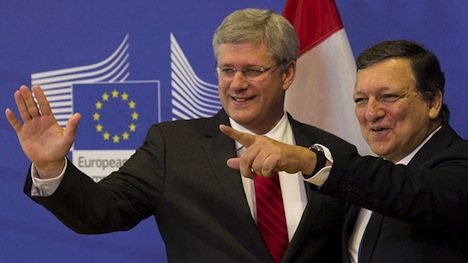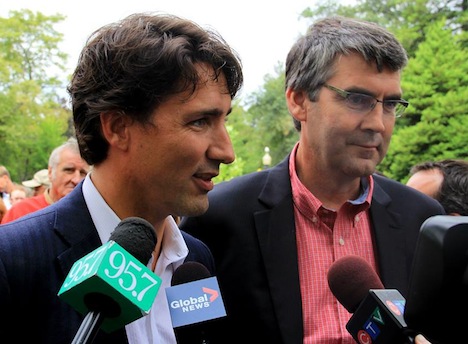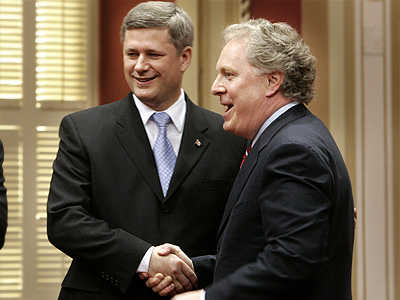Canadian prime minister Stephen Harper today celebrated the signing of a landmark free-trade deal between Canada and the European Union, bringing to fruition one of the top accomplishments that Harper can claim since taking office with a minority government in 2006 and a majority government in 2011. ![]()
Although the pact won’t be ratified until 2015, the Comprehensive Economic and Trade Agreement (CETA) removes tariffs between Canada’s economy and the $17 trillion economy of the European Union, which comprises 28 countries and over 500 million people. Together with the North American Free Trade Agreement (NAFTA), it will give Canada exclusive access to more than half of the global economy. CETA will allow Canadian automakers to export 12 times as many automobiles to Europe, and it will fully open the EU market to Canadian fruits, vegetables, wheat, grains and dairy, while removing tariffs on European wine and spirits, all seafood, metals and minerals (including steel and iron) and up to 29,000 tonnes of European cheese. Furthermore, Harper is considering granting compensation to Canada’s dairy producers, especially in Québec, if they lose revenue in the wake of the agreement.
What’s more, Harper (pictured above with European Commission president José Manuel Barroso) will be able to brag that his vision for a Canadian-European free trade agreement served as a precedent for the Transatlantic Trade and Investment Partnership (TTIP) still being negotiated between the United States and the European Union.
At a time when the Liberal Party has emerged from the brink of political oblivion with the selection of its popular, telegenic leader Justin Trudeau, to lead polls in advance of the 2015 election — an iPolitics/EKOS poll earlier this week gave the Liberals 36% support to just 26% support for Harper’s Conservative Party and 25% for the social progressive New Democratic Party — the completion of CETA and its ratification gives Harper three domestic policy wins.
First, it’s perhaps his most significant policy accomplishment in seven years. Second, not only does it give him a substantive accomplishment, it gives him one that bolsters the case that he’s dedicated to creating jobs and strengthening Canada’s economy, and it provides a contrast to Trudeau’s often wishy-washy blather. Third, it hoists a difficult choice on the NDP — support the CETA and anger labor unions, especially within its new Québécois stronghold; or oppose to CETA to draw a stronger contrast to Trudeau’s newly invigorated Liberals.
But don’t expect much more in the way of ambition from Harper’s government this year.
The agreement comes after the reading of Harper’s 2013 Throne Speech, much of which constituted a victory lap detailing Canada’s superior employment and economic record compared to its developed-world peers, such as the United States and the European Union, where political instability, stagnant GDP growth and joblessness have been more acute. While Harper hopes to pass a law requiring balanced budgets in the future, it’s unclear whether he can actually pass a bill through Canada’s parliament or that future governments would keep it in place.
The rest of Harper’s agenda amounted to an odd mix of populist consumer protection schemes:
The government promised to “take steps to reduce roaming costs” for cellphone users. It says it will take action so that cable and satellite customers can “choose the combination of television channels they want” by “unbundling” channel packages. And it promised to move on “hidden fees,” including making it so that “customers won’t pay extra to receive paper bills.” If this part of the agenda reads like it was pilfered from the NDP, that’s because to some extent it was.
It’s puzzling for a market-oriented party like the Tories to prioritize these kind of measures — services like Netflix and Hulu are already, in part, helped to unbundle television packages through market forces. Roaming costs for Canadian users are already coming down due to market pressures. So many of the consumer goals Harper listed are likely to come about through the market without the need for government interference.
It’s equally baffling to know how Harper will reduce ‘geographic price discrimination,’ his term for the price differential between consumer goods sold in Canada and the United States. Presumably, if the price difference is enough, Canadians (90% of whom live within 100 miles of the US border) will make a trip down south to buy them at cheaper prices, or enterprising entrepreneurs will find a way to undercut them — especially in the world of e-commerce.
But even more, it’s small ball. It’s the Canadian equivalent of former US president Bill Clinton’s much-derided 1995 agenda of school uniforms and ‘v-chips.’ Though consumer protection initiatives aren’t nothing, it’s hardly the kind of bold, conservative agenda that you might have expected Harper to champion upon coming to power seven years ago, and surely not what you’d expect from a government just two years after finally capturing a majority government.
John Ivison, writing in The National Post, likened the Throne Speech to ‘a botox treatment gone bad’:
The Throne Speech is littered with examples of the government wading into sectors of the economy to “fix” problems that should be left to either the market or the existing regulators — all to the detriment of millions of Canadian shareholders. It’s all so transparent and light as tinsel.
But it’s not just this year’s Throne Speech.
Aside from CETA, it’s hard to point to any truly groundbreaking, signature legislative acts in the Harper era. Sure, the government reduced the rate of the Goods and Services Tax from 7% to 5% by January 2008, and it will likely balance Canada’s budget by 2015. But those accomplishments, significant as they are, won’t be remembered in 50 or 100 years in the same way that CETA could be remembered. Continue reading Despite CETA signing, Harper’s 2014 agenda remains unambitious




